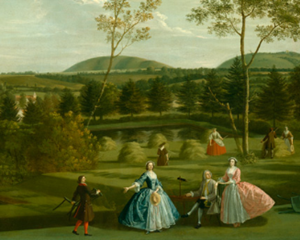For thousands of years, the mountains, lakes and forests of Britain have been just geography.
幾千年來,英國的山川林木不過是地理名詞。
But in the late 1700s, they became something much more -- the face of our nation. Our countryside became our country.
但在十八世紀末被賦予了新的涵義,成為國家的象征。英國的鄉村成了國家的縮影。
When homesick travellers thought fondly of Britain, they thought of their landscape. Most of us still do.
當思鄉的旅者深切回憶祖國,鄉愁中便滿載英國的自然景色。大部分人至今如是。
And it was, for the first time, a landscape of all the British nations -- the wild places of Wales and Scotland, as well as the peaks of Northern England, rediscovered, relished, mapped.
這縮影中首次囊括了英國的全部領土,威爾士和蘇格蘭的荒野,還有英格蘭北部的群峰,都被重新發現與定義,并繪入地圖。
For centuries, going to the country had meant, for the gentry, a stroll through a manicured estate, an Arcadia as drowsy with sunshine as an Italian afternoon.
幾世紀來,到鄉間對于紳士們來講,就是漫步于他們修建齊整的莊園,在他們的世外桃源享受慵懶陽光,恰如午后的意大利。
But in the second half of the 18th century, there was a sudden change in the weather.
但在十八世紀下半葉,世風大變。
The more adventurous Britons had had enough of make-believe sunshine and shepherds. They wanted the real thing; they wanted it rough.
那些更愛冒險的英國人受夠了莊園里假惺惺的陽光和牧場。他們想要親身體驗大自然,渴望親歷艱險。
And they were prepared to go to places where no one in their right mind a generation before would have dreamt of setting foot.
而他們作好準備將要涉足的土地,是上代人做夢也不敢想的。
But those who clambered up the crags weren't just out for thrills.
但那些攀巖峭壁的人可不僅僅是圖刺激。

In the wild places, they thought, might have survived the kind of Britons who'd stayed miraculously untouched by the evils of town life, its corrupt politics and diseased bodies.
他們認為在荒野之中,或許還存留著些許英國人奇跡般地躲過了都市魔爪以及腐化政治和病態社會的影響。
If we could somehow learn from their childlike innocence, we could become like them and recapture what it meant to be free, to be a natural-born Briton.
如果我們能學習這些人孩童般的純真,或許就能變得像他們一樣重拾自由平等的意義,做回自然純樸的英國人。
Nature, in the last decades of the 18th century, came to mean something far more important than gardening or hiking.
"自然"一詞在十八世紀最后的幾十年中不僅是指園藝或徒步旅行,而變得別有深意。
A love of nature became code for a crusade, a revolution even.
對自然的崇尚暗示著對改革,甚至革命的期許。
And this time, the crusaders weren't going to be in chain mail.
這次革命的領軍者并非身著鎖子甲的士兵們。
They would be poets, painters, hack journalists, men and women who sensed a great change coming and were rushing to embrace it. What they saw coming was dark and dirty weather.
而是詩人、畫家和雇傭文人,那些嗅到改革氣息并張開懷抱迎接時代改變的人們。他們嗅到的是一場狂風暴雨。
Britain was about to be hit by an immense political cyclone -- a revolution in France, just over the Channel.
一股強大的政治颶風正在逼近英國--大革命席卷的法國就在英吉利海峽那頭。
The boldest of the poets and pamphleteers longed for the storm to strike here, too.
那些詩人和檄文作者中的膽大之人渴望這場風暴也能席卷英國。
More anxious souls were afraid that where there was lightning there would also be fire and destruction.
而那些焦慮的人們又在擔心閃電照亮之處難免要伴隨著烈火與毀滅。
In the end, Britain would weather the storm. But as the Duke of Wellington once famously put it, it was "The nearest-run thing you ever saw in your life."
英國最終還是卷入這場風暴。正如威靈頓公爵那句名言所說,這是"你一生所見最勢均力敵的較量"。
Just how near-run? Wait and see.
但實力究竟有多接近?我們等著瞧。












